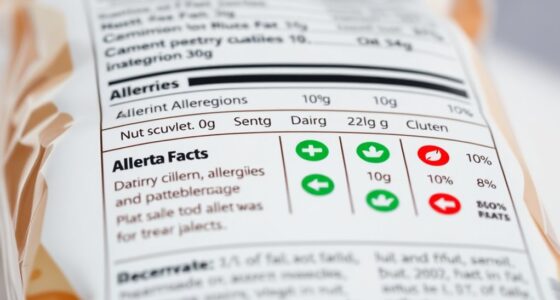To understand food truck zoning laws, you need to know where you can park, what signage is allowed, and any permits required for operation. Different zones, like commercial, industrial, or residential areas, have specific rules, and some locations may need special permits or variances. You must also avoid restricted spots such as fire lanes or private property. Exploring local ordinances and regulations helps guarantee you stay compliant—continue to uncover more details in the upcoming sections.
Key Takeaways
- Zoning laws determine where food trucks can legally operate, often requiring permits for designated areas.
- Different zones (commercial, industrial, residential) have specific restrictions and allowances for food truck parking.
- Signage regulations specify size, placement, and content, impacting how food trucks can advertise and identify themselves.
- Licensing and permits, including temporary and special event permits, are essential to ensure legal operation within zoning laws.
- Engaging with community and understanding local variance processes can facilitate approvals and compliance.
Overview of Food Truck Zoning Regulations
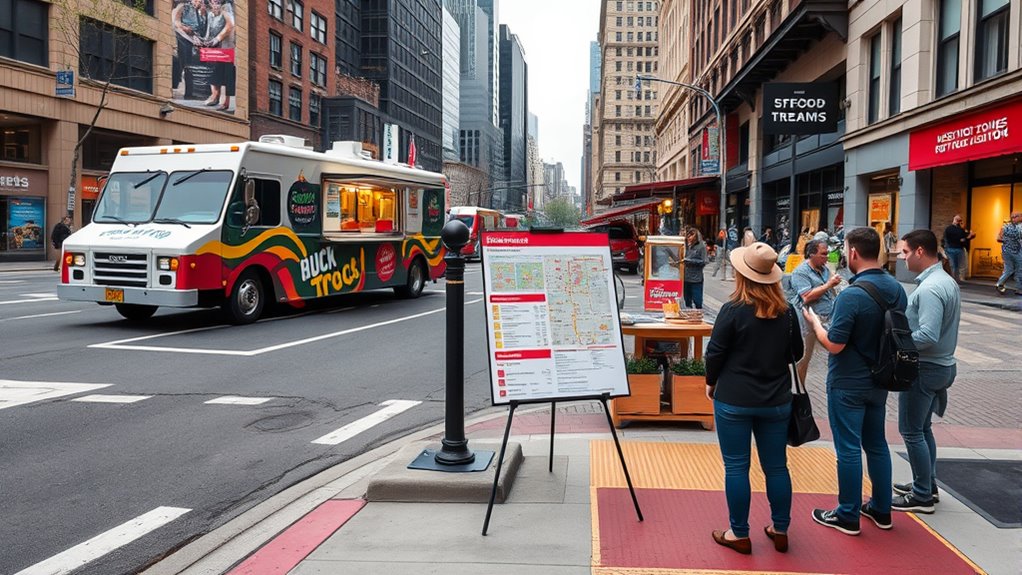
Understanding food truck zoning regulations is essential if you want to operate legally and avoid fines. These regulations govern where you can park your food truck and what signage you’re allowed to display. Food truck parking rules vary by city and district, often restricting parking to specific zones or requiring permits. You need to find designated areas that permit mobile food vendors, ensuring you’re not blocking traffic or private property. Signage regulations also come into play; they specify size, placement, and content restrictions to prevent visual clutter and maintain community aesthetics. Failing to comply with these rules can lead to citations or even shutdowns. By understanding and adhering to parking and signage regulations, you ensure smooth operations and avoid costly penalties. Additionally, being aware of juice detox guidelines can help you maintain health while managing your busy food truck schedule.
Types of Zones Permitting Food Trucks
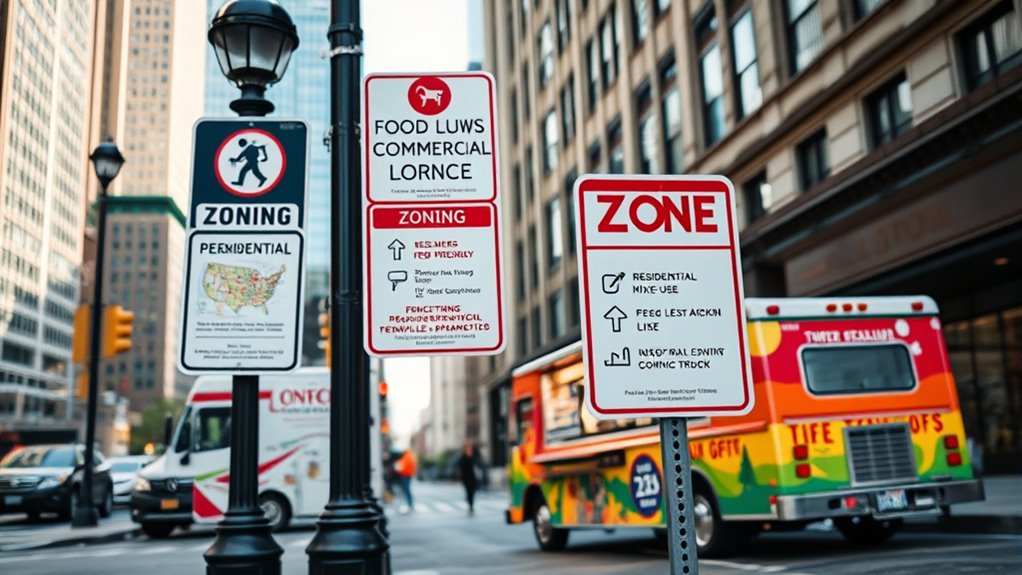
Different zones within a city designate areas where food trucks can operate legally. Commercial zones often allow food truck parking on designated streets or lots, making it easier to serve customers. Industrial zones may also permit food trucks, but with stricter vendor restrictions to control noise and congestion. Residential zones typically restrict food truck parking to prevent disturbances, though some areas may have specific exceptions or designated event zones. Public parks and special event zones are common locations for food trucks, provided you adhere to local regulations. Knowing the type of zone helps you understand where you can operate without issues. Always check local zoning maps and ordinances to ensure you’re compliant with vendor restrictions and food truck parking rules that vary across zones. Understanding zoning regulations is essential for successful food truck operation and avoiding legal issues.
Licensing and Permitting Requirements
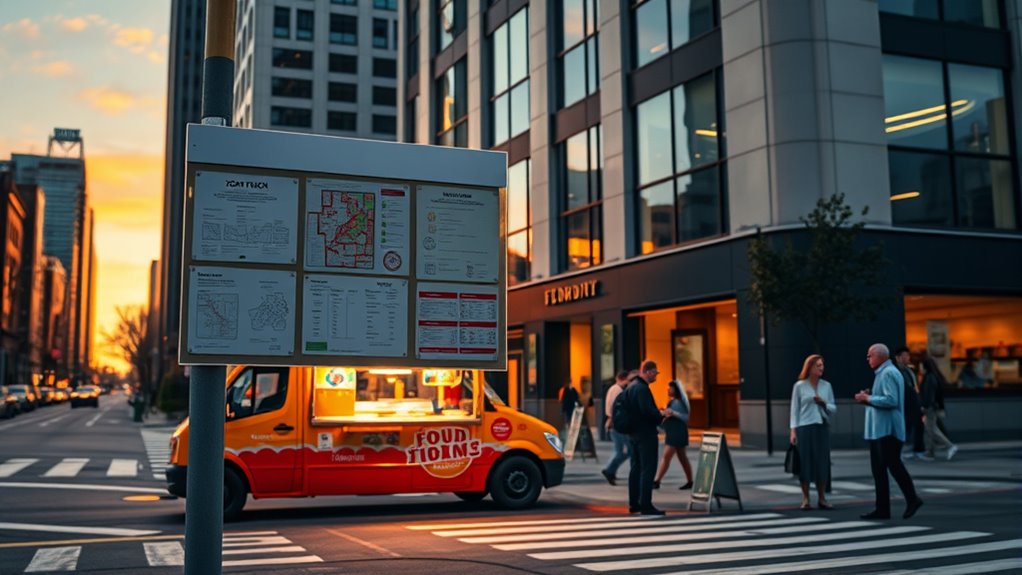
Getting your food truck ready to hit the streets means understanding the licensing and permits required. You’ll need to complete a license application process and obtain health and safety permits to operate legally. Staying compliant guarantees you avoid fines and keep your customers safe. Additionally, understanding regulatory requirements can help ensure your operations run smoothly and without legal issues.
License Application Process
Applying for a food truck license involves steering through various licensing and permitting requirements set by local authorities. You’ll need to prepare specific documents and meet criteria related to your food truck’s aesthetics and vendor signage. To navigate the process smoothly, consider these key steps:
- Complete the application form accurately, including details about your truck’s design
- Submit proof of food truck aesthetics that meet local standards
- Provide images or descriptions of vendor signage for approval
- Obtain necessary permits for parking and location restrictions
- Pay applicable fees and schedule inspections if required
- Be aware of regulatory compliance challenges that may arise with newer food truck regulations.
Understanding these requirements helps ensure your application moves efficiently. Be proactive in providing clear, detailed information about your truck’s appearance and signage to avoid delays.
Health and Safety Permits
Are you aware of the vital health and safety permits required to operate a food truck legally? These permits ensure you meet local health standards and avoid penalties. You’ll need to pass health department inspections, which verify your food handling, sanitation, and truck cleanliness. Securing proper food truck insurance is also essential—it protects you from liabilities and demonstrates compliance with safety regulations. Before opening, check with your local health department to understand specific permit requirements, as they vary by location. Maintaining good hygiene, regular inspections, and proper insurance coverage help keep your food truck operations smooth and compliant with all safety laws. Understanding the mechanics of food safety and proper sanitation practices can significantly reduce the risk of violations. Failing to meet these requirements can result in fines, shutdowns, or legal issues.
Restricted Areas and Prohibited Locations
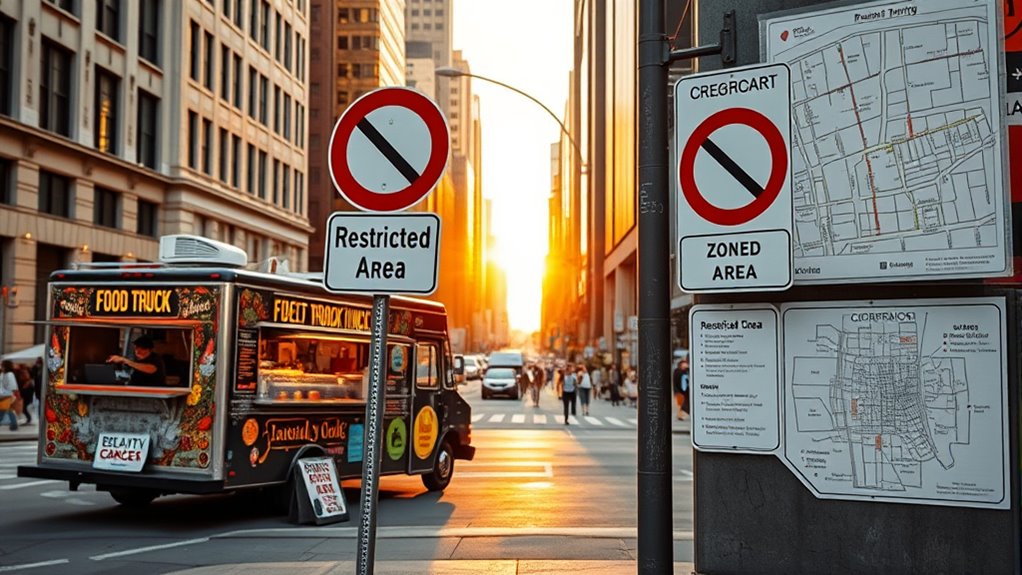
Many cities impose restrictions on where food trucks can operate, often designate certain areas as off-limits to guarantee safety and manage traffic flow. You should be aware of prohibited locations, such as sidewalks, private properties without permission, and near emergency exits. Parking restrictions also limit where you can set up, especially in designated disabled or loading zones. Noise ordinances may restrict operating hours or loud music, so you don’t disturb residents or businesses. Additionally, understanding automation in business can help in planning efficient operations and complying with local regulations. Be mindful of:
- No parking in fire lanes
- Avoiding prohibited zones near schools or hospitals
- Respecting residential neighborhood restrictions
- Complying with noise level limits
- Not parking in pedestrian-heavy areas
Knowing these restrictions helps you avoid fines and ensures smooth operation.
Hours of Operation and Time Restrictions

Knowing where you can operate is just the first step; understanding the allowed hours of operation and time restrictions is equally important to stay compliant. Many cities impose specific hours when food trucks can operate, often to reduce noise disturbances and traffic issues. You’ll need to familiarize yourself with local noise ordinances, which limit loud sounds during certain times, especially early mornings or late nights. Parking restrictions may also limit your operating hours, such as prohibiting parking during peak traffic times or requiring you to vacate a spot by a certain hour. Staying within these timeframes not only helps avoid fines but also maintains good relations with the community. Being aware of these time restrictions can help you plan your daily schedule more effectively. Always check with local authorities to guarantee your hours align with city regulations and avoid potential violations.
Special Permits and Temporary Use Exceptions
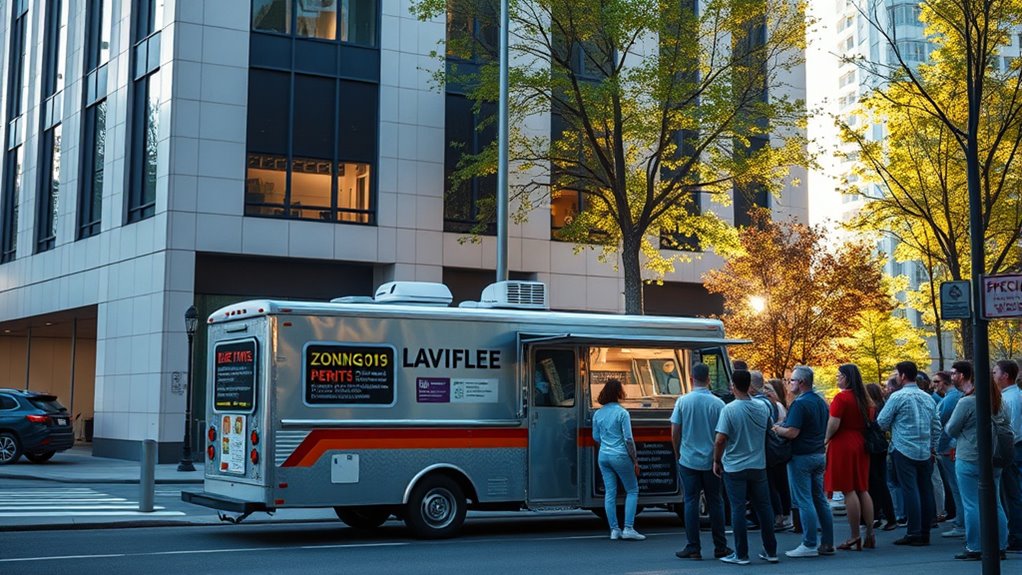
Getting a special permit or temporary use exception is often required to operate a food truck in certain areas. You’ll need to complete an application process that includes specific regulations for temporary setups. Understanding these requirements helps you avoid delays and guarantees you’re compliant with local laws.
Permit Application Process
Are you aware of the steps involved in applying for a food truck permit? The process often requires securing special permits or temporary use exceptions. First, you’ll need to submit an application that includes details about your food truck, proposed food truck parking locations, and proof of vendor insurance. Next, you may need to provide site plans or parking diagrams. Authorities will review your application for compliance with zoning laws and health regulations. Once approved, you’ll receive a permit, but some areas require a fee or additional documentation. Keep in mind, the process varies by city, so it’s essential to stay informed. Understanding zoning laws can help streamline your permit approval process.
Temporary Use Regulations
Temporary use regulations, including special permits and temporary use exceptions, let you operate food trucks in certain areas without full zoning compliance. These provisions often streamline approval processes, allowing you to set up shop for limited periods, especially during special events or festivals. However, you still need to adhere to parking regulations, ensuring your truck doesn’t block traffic or violate designated parking zones. Signage restrictions are also common; you might be limited in the size, placement, or type of signs you can display. These rules help maintain safety and neighborhood aesthetics while giving you flexibility to serve customers temporarily. Additionally, understanding Self Watering Plant Pots can provide insights into managing resources efficiently during your operations. Always check local ordinances to understand the specific requirements and ensure your temporary operations stay compliant.
Navigating Local Zoning Variances and Appeals

Managing local zoning variances and appeals can be a complex process, but understanding the steps involved helps you advocate effectively for your food truck. To succeed, you should:
- Engage with community members to build support for your variance request
- Prepare documentation addressing parking considerations and community impact
- Attend public hearings to present your case clearly and confidently
- Respond promptly to any feedback or objections from local officials
- Follow up on decisions and understand the appeal process if denied
- Familiarize yourself with food truck zoning laws and how they apply to your specific location
Frequently Asked Questions
How Do Zoning Laws Differ Between Cities or States?
When you explore how zoning laws differ between cities or states, you’ll notice variations due to local ordinance differences and zoning map variations. Each city or state creates its own rules, affecting where and when you can operate your food truck. You need to check your specific area’s zoning map and local ordinances to make certain of compliance. These differences can influence your planning, permits, and operating hours, so stay informed about your local regulations.
Can Food Trucks Operate in Residential Neighborhoods Legally?
You might wonder if food trucks can operate legally in residential neighborhoods. It depends on local regulations, but generally, parking restrictions and noise ordinances play a big role. Many areas restrict food truck activity to prevent disruption, so you’ll need to check specific city or neighborhood rules. If you follow parking rules and keep noise levels down, you might be able to operate, but always verify with local authorities first.
What Penalties Exist for Non-Compliance With Zoning Laws?
Think of zoning laws as the guardrails guiding your food truck journey. If you ignore them, parking violations may pile up like dangerous stones, risking your progress. More seriously, authorities can revoke your license, halting your operation altogether. Non-compliance sends a clear message: breaking the rules invites penalties that can derail your business, making it essential to follow zoning laws closely and stay on the right path toward success.
How Long Does the Permit Approval Process Typically Take?
The permit approval duration can vary based on your local regulations, but typically, the permit timeline ranges from a few weeks to a couple of months. You should expect to submit all necessary documents promptly to avoid delays. During this process, authorities review your application, inspect your food truck, and make certain compliance with zoning laws. Staying proactive and providing clear information helps speed up the approval duration.
Are There Specific Safety Standards Required for Food Truck Zoning?
Ironically, safety standards for food trucks aren’t just about avoiding fines—they’re about keeping you and your customers alive. You’ll need to pass health inspections and meet fire safety requirements, which means proper sanitation and fire suppression systems. Though it might seem tedious, these standards protect everyone. So, don’t think of them as hurdles, but as essential steps to make certain your food truck stays on the road and out of trouble.
Conclusion
Think of zoning laws as the map guiding your food truck journey. By understanding and respecting these rules, you become the skilled navigator, steering clear of legal storms and dead ends. With each permit and regulation you master, you’re building a clear path toward success. Embrace the adventure, and soon you’ll be savoring the sweet taste of smooth sailing, serving delicious food to happy customers—your very own culinary voyage on a well-charted course.





